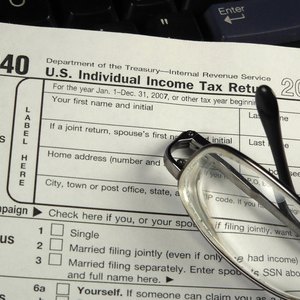
Patents are not on the short list of noncapital assets published by the Internal Revenue Service (IRS) and are therefore considered capital assets. The capital assets category carries with it tax ramifications, though documentation is necessary to take advantage of capital gains tax benefits with respect to patents.
Capital Asset
Almost all personal possessions and property are considered capital assets, including stocks and bonds, cars, houses, jewelry, collections and furniture. The IRS negatively defines capital assets by publishing a list of noncapital assets and stating that anything not on that list is considered a capital asset. Patents--and exclusive licenses--are considered capital assets.
Patent
A patent is a title issued by a national government that grants the holder a limited monopoly--usually 20 years--to manufacture, distribute, import, sell and use an invention. Inventions (industrial designs are also covered by patents) must have an industrial application, defined broadly. Patent holders can give legal permission, in the form of a license, for others to manufacture, distribute, import, sell or use the invention.
Licenses
Exclusive licenses on patents are also considered capital assets. An exclusive license is when a patent holder issues another entity legal permission to use the patented product and guarantees that permission will not be given to anybody else (essentially transferring the patent holder’s monopoly on the product).
Capital Gains
It is important to know if an item qualifies as a capital asset for tax purposes in case the item is sold at a profit. If an individual profits from selling a capital asset, that sale can be reported as a capital gain, which carries a preferential tax rate. Hence, if a patent holder sells or licenses a patent in a given tax year, the profit can be listed as a capital gain, saving the seller money on taxes.
Considerations
To claim the sale of patents and licenses as a capital gain, an accountant or individual must have the proper paperwork. Juan Villar, an attorney specializing in intellectual property law, cautions that most patent holders and attorneys are not familiar with patent-specific tax issues. According to Villar, the documentation needed to claim patent sales and licensing fees as capital gains is more extensive and specific than documentation for more common types of capital assets. Many patent holders do not realize this and lose the benefit of capital gains tax rates by providing accountants with incomplete documentation.
References
- IRS: Ordinary or Capital Gain or Loss
- Internal Revenue Service. "Publication 544: Sales and Other Dispositions of Assets." Page 23. Accessed Feb. 8, 2020.
- Internal Revenue Service. "Publication 544: Sales and Other Dispositions of Assets." Page 24. Accessed Feb. 8, 2020.
- Internal Revenue Service. "Investment Income and Expenses (Including Capital Gains and Losses." Page 49. Accessed Feb. 8, 2020.
- Internal Revenue Service. "Publication 544: Sales and Other Dispositions of Assets." Page 21. Accessed Feb. 8, 2020.
- Congess.gov. "H.R.1 - An Act to provide for reconciliation pursuant to titles II and V of the concurrent resolution on the budget for fiscal year 2018." Accessed July 17, 2020.
Writer Bio
Calla Hummel is a doctoral student studying contraband in international political economy. She supplements her student stipend by writing about personal finance and working as a consultant, as well as hoping that her investments will pan out.

